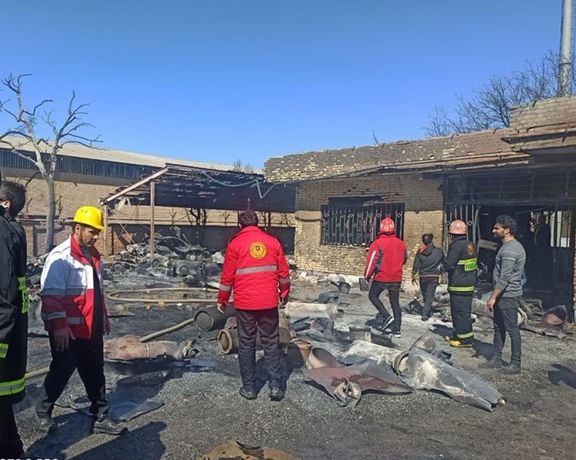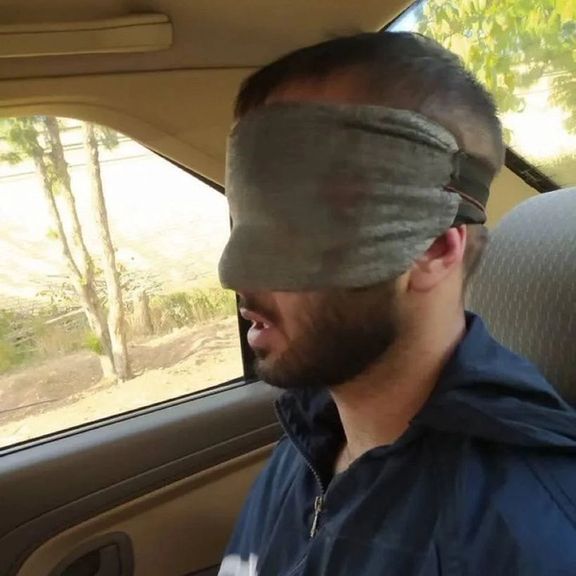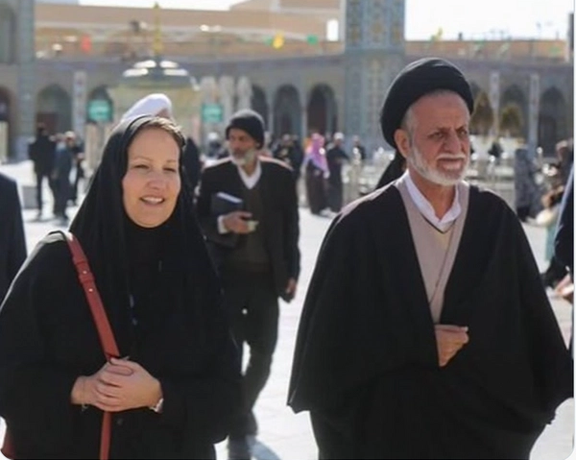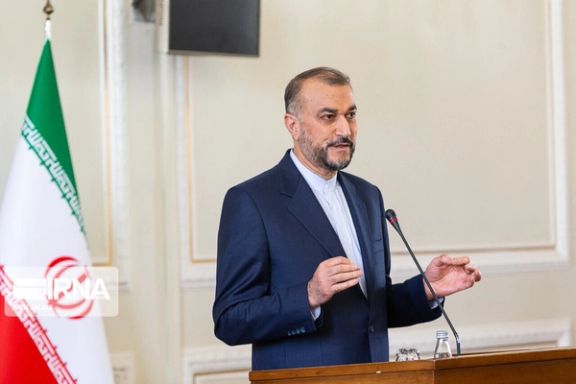Blast At LPG Station Injures Three In Western Iran

Officials in Hamedan, western Iran, says at least three people have been injured after an explosion in a large, liquefied petroleum gas charging unit.

Officials in Hamedan, western Iran, says at least three people have been injured after an explosion in a large, liquefied petroleum gas charging unit.
The spokesperson of the emergency department in the city, Mohammad Shokouhi told Tasnim news website, affiliated with the Revolutionary Guard, that three ambulances were dispatched to the place after citizens reported the blast.
“Fortunately, there are no deaths in the incident so far, but three people, including a woman and two men, are injured,” he added.
The semi-official ISNA also quoted Head of Hamedan Fire Department, Sadeq Pour-Sina as saying that a building inside the center's premises caught fire as well.
Pour-Sina stated that five vehicles caught fire in this accident, reminding that carelessness during the charging of LPG capsules was the cause of the accident. It is not possible to determine the cause of the accident from independent sources.
An LPG car is designed from the factory to run on liquefied petroleum gas, or has been converted to take LPG by an aftermarket conversion company. They are sometimes referred to as dual fuel or Bi-Fuel cars, as they can switch between LPG and petrol.
Safety experts believe that the use of liquid gas and non-standard gas cylinders in vehicles is dangerous because in case of the smallest accidents, there is a possibility of explosion.
There are 25 million cars running on LPG worldwide, including 13 million in Europe alone. However, unsafe practices may lead to a higher level of risk.

A hardliner newspaper in Tehran has demanded that German embassy staff be banned from leaving Iran in response to expulsion of two Iranian diplomats from Berlin.
The editor and representative of Supreme Leader Ali Khamenei in Kayhan Daily, Hossein Shariatmadari also called for the prosecution of a person he called an "intelligence officer stationed at the German embassy".
Shariatmadari’s demand is reminiscent of the takeover of the US embassy by radicals in Tehran after the 1979 revolution when dozens of embassy staff were held hostage for 444 days.
This hardliner editor, who is said to be one of the interrogators of political prisoners, added that "The next step should be filing a complaint against the German government at the International Criminal Court for sending terrorists to Iran to massacre the oppressed people of the country."
Iran's judiciary sentenced Iranian-German national Jamshid Sharmahd to death on security charges February 20.
Sharmahd, who is also a US resident, is accused by Tehran of heading a pro-monarchist group blamed by the government for a deadly 2008 bombing and planning other attacks in the country.
In response, Germany declared two employees of the Iranian embassy personae non gratae and ordered them to leave the country on Wednesday.
However, Shariatmadari claimed, "Sharmahd has been tasked with carrying out terrorist operations by the German government, and the action of the German Ministry of Foreign Affairs in summoning the Iranian ambassador and expelling two employees of Iran’s embassy is a type of deception operation to wipe off the traces of the German government’s involvement in this terrorist operation.”

German parliament member Ye-One Rhie has expressed concern over the health condition of Iranian dissident popular rapper Toomaj Salehi who is imprisoned by the regime.
Ye-One Rhie, who is the political sponsor of Toomaj Salehi, wrote in a tweet Wednesday that “Toomaj has been in solitary confinement nonstop for 116 days. His health is worrying. His injuries by torture have never been treated. It's not only his eye but also his hands, his rips and his leg. These could lead to permanent damage.”
She went on to say that the whole world should know who is responsible: Investigator Mohammad Hossein Bakhshi and Prosecutor Mousavian charged Toomaj Salehi with "Corruption on Earth" and "War against God".
In this regard, Toomaj Salehi's twitter account also expressed concern about the deteriorating health condition of the rapper.
Salehi is an artist mostly known for his protest songs about Iran's social issues and injustice by the government. Salehi was arrested on October 30th as part of the crackdown on opponents.
His arrest came shortly after his interview with the Canadian Broadcasting Corporation, saying that “You are dealing with a mafia that is ready to kill the entire nation... in order to keep its power, money and weapons.”
In his politically charged songs such as “Buy a Rat Hole” (2021), Toomaj, a 32-year-old metalworker in Esfahan, spoke out against repression, injustice, poverty, and authorities’ own corruption and impunity from prosecution.

Iranians opposing compulsory hijab are outraged by the Swiss envoy’s decision to wear a long black veil during a shrine visit which a hardliner website has described as “dazzling”.
Photos of Nadine Olivieri Lozano wearing a long black veil that covers the head and the whole body during a visit to Qom were widely published by hardliner media with headlines such as “Swiss Ambassador in Iran Wears Chador” by Hamshahri Online and “Swiss Ambassador’s Visit To Our Lady Masoumeh’s Shrine in Dazzling Hijab” by Arsheh Online.
In the photos, Lozano is seen with several clerics at the shrine and receiving a gift, a religious book, from one of the shrine’s caretakers.
These media outlets said Lozano had traveled to Qom, about 120 km to the south of Tehran, to familiarize herself with Islamic culture and art and the architecture of the shrine. Qom is Iran's second most important religious city, after Mashhad and is home to biggest and most prestigious of Iran's Shiite seminaries.
“Instead of reacting to the atrocities of the regime against women for flouting their hijab or visiting the graves of women and girls who were innocently killed, the Swiss ambassador, who is a woman herself, dons a chador and visits the Shrine of Masoumeh in Qom alongside their killers,” one of the critics, Sarbaz-e Vatan (Soldier of the Motherland), twitted with a photo showing the Swiss ambassador walking with a cleric in the courtyard of the shrine.
Mehdi Hassanpour, another critic, argued in his tweet that the Swiss ambassador’s wearing of the black veil was an insult to both Iranian and Swiss women and demanded her resignation.
Others pointed out that by visiting the shrine and wearing a chador, the Swiss ambassador had provided the “oppressors” of the Iranian women with an opportunity for good publicity at a time when Iranian women were fighting for freedom from compulsory hijab.
Federica Mogherini Former High Representative of the European Union for Foreign Affairs and Security in 2015.
Wearing a chador is required at Shia shrines which often provide them to women who visit. Chadors, however, do not have to be black. The black chador which the Swiss ambassador was wearing during her visit is lauded by the religious establishment as the ‘ultimate hijab’. Visiting female foreign dignitaries are also always required to wear a long headscarf but not a chador during their visit.
Hardliners and clerics of Qom often complain about women in their city not observing the hijab rules “appropriately” and demand its stricter enforcement by the authorities.
According to a commentary by the Revolutionary Guards (IRGC) linked Fars news agency two years ago, the number of women who traditionally wore the black chador was dropping by the day in Qom.
Some of the top clerics in Qom and religious hardliners have repeatedly demanded from the authorities to enforce the hijab rules in their religious city more strictly and to put an end to what they believe are signs of moral depravity among its citizens.
There has been a spate of mysterious poisonings in girls’ schools in Qom since November 30. On Wednesday, three other schools in Qom were attacked and fifteen girls were hospitalized with various symptoms of poisoning.
Some officials have also said that the poisonings could be “deliberate”. In a letter to the prosecutor of Qom Public and Revolutionary Courts Monday, Prosecutor General Mohammad-Jafar Montazeri said “deliberate criminal activity” was suspected in the school poisonings.
Many say on social media that the poisonings that have affected at least 400 girls so far are the work of an extremist group that wants to force girls give up their education by acts of terror.

The United States denied it is pressuring Britain not to list Iran’s IRGC as a terrorist organization, as reported by The Telegraph on Wednesday.
State Department spokesperson Ned Price responding to a question by Iran International’s reporter Samira Gharaei during his press briefing said, “We list the IRGC as a foreign terrorist organization, so the idea that we would be encouraging – actively encouraging other countries not to take an approach that we’ve taken doesn’t ring true to me…,” he said.
The Trump administration listed the IRGC as a terrorist group in 2019 after it withdrew from the 2015 nuclear deal and imposed ‘maximum pressure’ sanctions on the Islamic Republic.
Earlier Wednesday, The Telegraph reported, “Joe Biden’s diplomats are pressing the UK Government not to formally declare Iran’s Revolutionary Guard a terrorist group, despite the Home Office backing the move...The US State Department has argued that the UK can play a key role as interlocutors with Tehran which would be undercut by the designation, according to Whitehall insiders.”
Many politicians in Europe have been urging the designation of Iran’s Revolutionary Guard as a terror organization in the wake of bloody violence against protesters in Iran and IRGC’s other malign activities.
European Union officials, however, have delayed the move arguing that such a decision must be backed by a legal determination of a European court.
British police advised Iran International last week to relocate its broadcast operations from London to Washington DC because of real threats by IRGC agents against its journalists.

While Tehran has not changed its policies in the region, Foreign Minister Hossein Amir-Abdollahian claimed the Islamic Republic would welcome the resumption of ties with Saudi Arabia.
According to AFP, Amir-Abdollahian made the comments in his visit to Baghdad on Wednesday during talks with his Iraqi counterpart about the stalled negotiations between Tehran and Riyadh, which were held with the mediation of Baghdad.
Baghdad plays the role of a mediator in the talks between Tehran and Riyadh, which have been cut off since about seven years ago.
These negotiations started two years ago in Iraq and have been halted for more than a year now.
At a joint press conference with Iraqi Foreign Minister Fuad Hussein, Amir-Abdollahian said Tehran welcomes the Iraqi government's "efforts to strengthen dialogue and cooperation between Saudi Arabia and Iran."
He also referred to a similar mediation by Baghdad in talks between Tehran and Cairo to warm their relations.
The statements by Amir-Abdollahian come while a few months ago, Mohammed bin Salman, the Crown Prince of Saudi Arabia, and Abdel Fattah El-Sisi, the President of Egypt emphasized the necessity of preventing Iran from acquiring nuclear weapons.
After a meeting in Cairo in June, bin Salman and Sisi stressed his support for international efforts to prevent Tehran from developing nuclear weapons and to create a zone free of weapons of mass destruction in the Middle East.